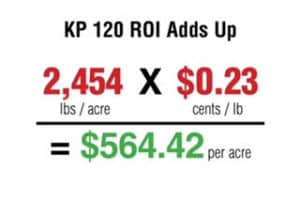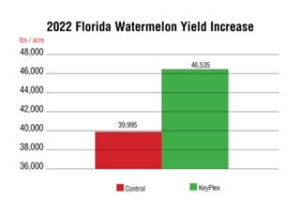Smart farmers know the importance of conducting their own field trials before fully adopting crop inputs.
It makes sense to see how products perform and if there’s a return on investment.
That’s what several watermelon growers in Florida have been doing for the past four years in cooperation with KeyPlex. The eight field trials were simple but telling in evaluating the performance of KP 120. The growers took fields and split them in half, applying their standard production program on the entire field, but one half receiving the addition of KP 120. The half not receiving KP 120 was considered the control. KP 120 was sprayed by foliar application. It can be tank-mixed with standard crop inputs.
KP 120 is a formulation of micronutrients most often found deficient in commercial crops and trees. It contains alpha-keto acids, which may facilitate utilization of micronutrients, and it is a biostimulant peptide that can increase resistance to environmental stress. It also contains humic acid, which may enhance soil micronutrient availability. It has fungicidal activity and has shown very good results on gummy stem blight.
PROVEN IN THE FIELD
Would KP 120 increase yields and profitability? That was the question growers sought to answer with their trials. The answer was a resounding yes. In five of the eight trials, KP 120 was applied twice, while three sites applied it three times. Some gains were higher in some fields, but all trial sites benefited from KP 120 applications.
 “When you take all of the trial sites over the four years, we saw an average increase in yields of 2,454 pounds per acre,” says Heath Prescott, KeyPlex regional sales manager. “If you take 23 cents per pound, which has been a fairly average price during that time, that 2,454 pounds would bring $564.42 per acre. That’s a 6.6% increase in revenue on that acre where KP 120 was applied.”
“When you take all of the trial sites over the four years, we saw an average increase in yields of 2,454 pounds per acre,” says Heath Prescott, KeyPlex regional sales manager. “If you take 23 cents per pound, which has been a fairly average price during that time, that 2,454 pounds would bring $564.42 per acre. That’s a 6.6% increase in revenue on that acre where KP 120 was applied.”
Prescott says some locations had even larger increases. One field near Tiger Bay saw a 16% average increase in yields over the four years of trials.
“One of the benefits of KP 120 is it increases the ability of plants to utilize nutrients already in the soil,” says Gerald O’Connor, KeyPlex chief executive officer. “The product comes with a total nutrient package, but that added ability to uptake existing nutrients gives it even more of a synergistic boost.”
PLANT ACCELERATOR
One of the key benefits of applying KP 120 is it helps watermelons get over transplanting stress and off to a fast-growing start. The first application is recommended within a week of transplanting. In the field trials, KeyPlex Jumpstart was part of the growers’ standard program, so it was in the tank with KP 120 and also applied on the control half of the field.
 “We want to eliminate as much stress as we can on these plants after transplanting. This first application helps the watermelon get accustomed to its new environment in the soil and get a boost to start growing fast,” Prescott says.
“We want to eliminate as much stress as we can on these plants after transplanting. This first application helps the watermelon get accustomed to its new environment in the soil and get a boost to start growing fast,” Prescott says.
The second application of KP 120 is recommended right before flowering. A third application was made in two of the field trials, which came a couple of weeks prior to the first harvest. “Ideally, we’d like to see growers make three KP 120 applications to help during those stress periods of watermelon growth — transplant, flowering and pre-harvest,” Prescott says. “This is just going to give them that extra boost of growth at critical times. We saw that in all the trials with increased yields to back that up.”
When late-season rains are forecast, the additional application can help plants ward off fungal diseases. “Some growers try to get an application out before the rain, but most come in right after with the spray. This has proven to be beneficial,” Prescott says.
THE BOTTOM LINE
“The success of our business only happens by ensuring that our growers are making money,” O’Connor adds. “These field trials are important because they answer the question whether KP 120 will put more money in their pocket. For three applications of KP 120, it costs roughly $45 per acre. With an average return of $564.32, I’d say that’s a good return on investment.”
The growers participating in the trials agree. After four years, they’ve seen enough and are applying KP 120 to their entire fields this season.
